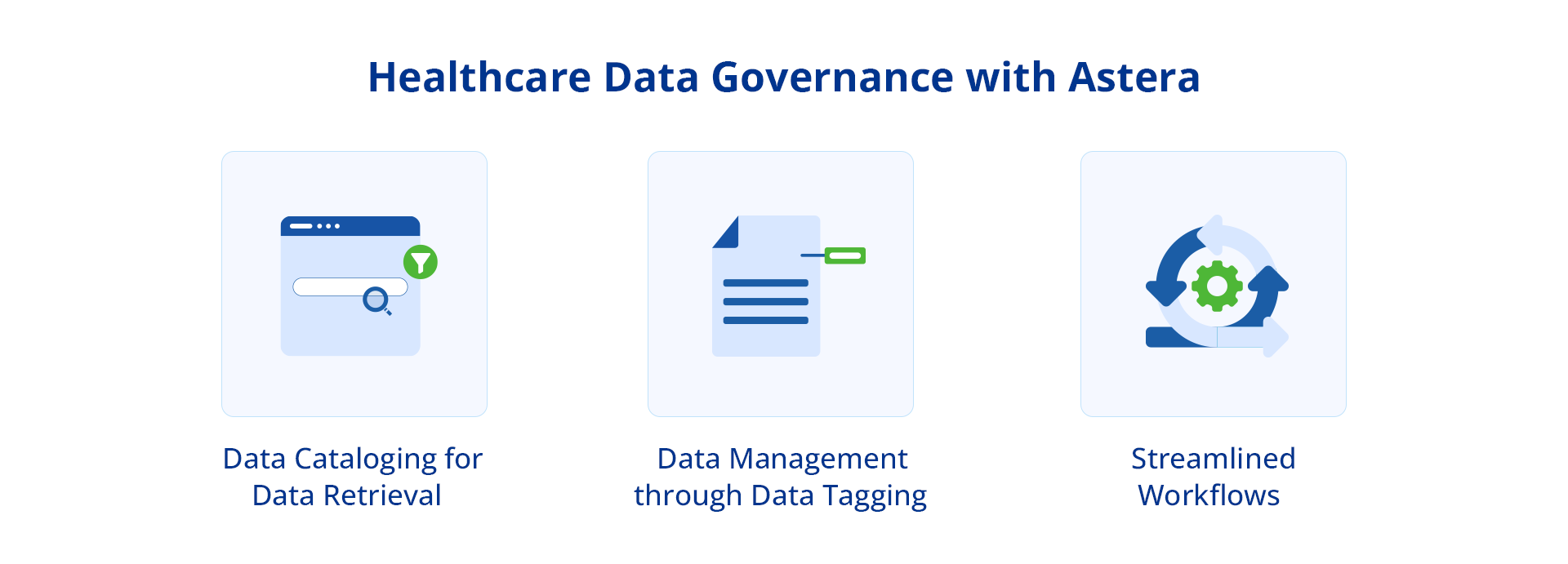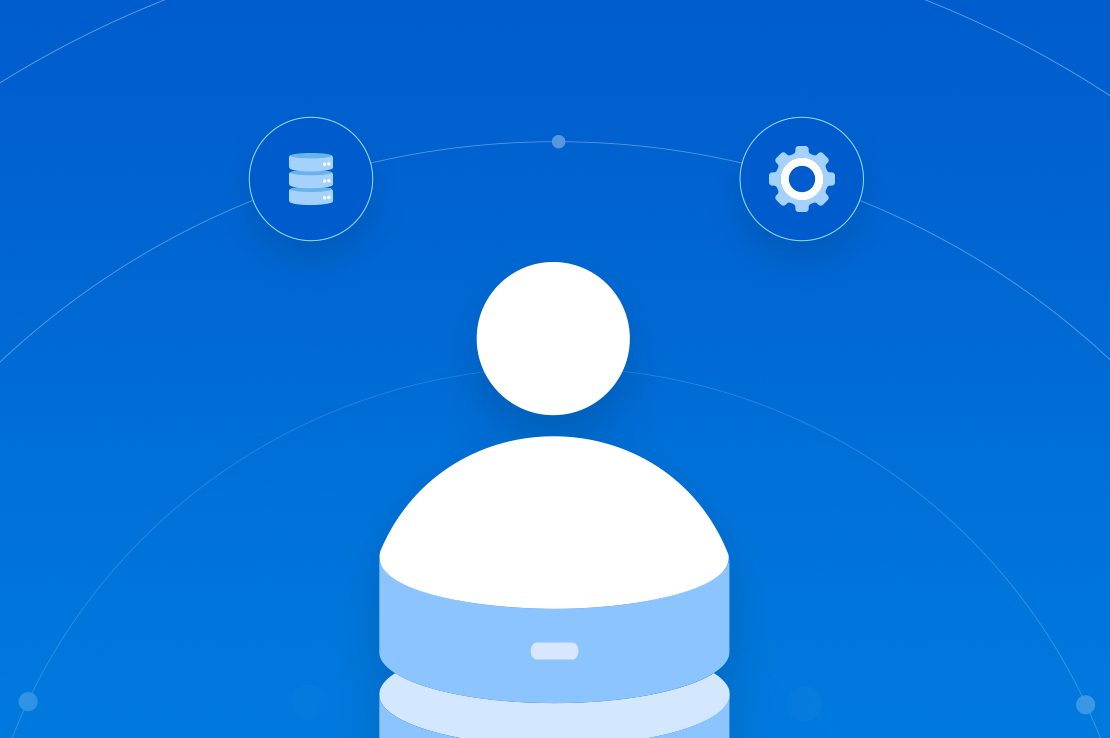
Improving Healthcare Data Governance and Integration with Astera
One of the key processes in healthcare data management is integrating data from many patient information sources into a centralized repository. This data comes from various sources, ranging from electronic health records (EHRs) and diagnostic reports to patient feedback and insurance details. Also, the volume of healthcare data is rising with every passing day, making healthcare data governance increasingly complex and, at the same time, essential for ensuring patient privacy, data accuracy, and regulatory compliance.
According to RBC, the digital universe of healthcare data is expected to increase at a compound annual growth rate of 36% by 2025. In response to this growing complexity and volume, Astera offers a comprehensive solution to seamlessly integrate diverse healthcare data sources and govern data assets, ensuring that all patient information is unified and accessible.
Healthcare Data Governance
Data governance in healthcare is a multifaceted approach that encompasses the establishment of policies and standards to ensure the effective management, security, and integrity of patient data. The delineation of roles and responsibilities for data stewardship, where individuals are entrusted with overseeing the lifecycle of data from collection to disposal, is an important component of healthcare data governance.
In parallel, data governance initiatives entail the deployment of advanced technologies to enhance patient data protection and access control mechanisms. Encryption, access controls, and robust authentication protocols are among the tools utilized to safeguard sensitive patient information from unauthorized access and cyber threats. With a data governance framework, healthcare organizations can harness the full potential of their data as a strategic asset, improving not just the bottom line but also patient care and clinical outcomes.
Integrating Disparate Healthcare Data
Data management is crucial for improving patient care and efficiency within the healthcare system. Healthcare providers often deal with data from various sources, such as EHRs, lab reports, imaging systems, and wearable health devices. However, a solution-focused approach can simplify the integration process and offer significant benefits.
Breaking down data silos is necessary to obtain a unified view of patient data. By integrating information from different sources, healthcare professionals can gain a comprehensive understanding of a patient’s health and improve the quality of care they provide. For instance, integrating real-time data from wearable devices with EHRs enables healthcare professionals to make timely interventions and tailor care plans according to individual needs.
Once the data is integrated, governance can further facilitate healthcare providers. By enhancing data discovery, hospitals can easily search and retrieve patients’ information. It ensures that data across all platforms is consistent, accurate, and easily accessible. Additionally, data governance enables healthcare providers to make more informed decisions, which can lead to better patient outcomes.
According to the McKinsey Global Institute, effective healthcare data integration and use of big data could generate up to $100 billion annually across the US healthcare system, highlighting the potential benefits of enhancing data integration and governance.
Healthcare Data Governance with Astera
Integrating diverse healthcare data into a unified system is only the first step towards transforming healthcare operations. The real utility lies in using the combined data effectively, made easier by Astera‘s advanced data governance features for organizing and finding data.

Data Cataloging for Data Retrieval
Astera‘s data governance solution comes with a data cataloging function that acts like a search engine for healthcare data, offering advanced search and filtering capabilities. This functionality allows healthcare professionals to quickly locate specific data sets or patient information. For example, a doctor looking for a patient’s history with conditions can quickly retrieve all relevant records without sifting through multiple systems or databases.
Data Management through Data Tagging
Additionally, Astera’s data tagging feature enhances how healthcare professionals manage and access data. By allowing users to tag data assets with specific labels, it simplifies organizing and finding data based on criteria such as disease type, patient demographics, or treatment outcomes. For example, if a healthcare provider tags patient records with “diabetes” and “2024 check-ups,” any team member searching for recent diabetes cases can quickly retrieve all relevant patient files without navigating through extensive databases.
Streamlined Workflows
The synergy between data integration and data governance through Astera streamlines workflows and enhances decision-making capabilities. Healthcare professionals can access a comprehensive view of patient data, enabling more accurate diagnoses, personalized treatment plans, and predictive health insights.
This integrated approach to data management and discovery boosts overall healthcare operational efficiency. With more accessible and systematically organized data, healthcare organizations can eliminate unnecessary administrative tasks and improve resource allocation.
Practical Application of Astera for Healthcare Transformation
Let’s say, Bright Future Clinic recently adopts Astera’s data management solution to tackle the challenge of efficiently managing chronic disease patients, focusing specifically on heart disease management. Astera facilitates data governance but also seamlessly integrates with existing systems and workflows. By integrating diverse healthcare data into a unified system, the clinic aims to streamline operations and improve patient care.
The clinic uses the data cataloging function as a search engine, enabling healthcare professionals to instantly find specific datasets or patient details. For instance, when a patient with a history of heart disease visits, a doctor quickly accesses their complete medical records, including previous EHRs, lab results, and medication history, without the need to sift through multiple systems.
Additionally, by implementing data tagging, the clinic organizes patient records and relevant health data with tags such as “heart disease,” “2024 consultations,” or “medication adherence.” This approach simplifies the organization and retrieval of data based on specific criteria, enhancing the ability to provide personalized and timely care.
The integration of Astera’s solution streamlines the clinic’s workflows, significantly improves decision-making, allowing healthcare providers to focus more on patient care and less on administrative tasks.
Advantages of Astera’s Integrated Approach
Astera’s integrated approach to healthcare data governance and management streamlines the entire data lifecycle, from acquisition to analysis, ensuring data remains an important asset for enhancing patient care and operational efficiency.
-
Improved Data Consistency
Astera’s data integration and governance solutions standardize the handling of patient data, ensuring every department works with the same, accurate information.
-
Enhanced Data Security
With Astera, healthcare providers can enforce strict data security measures. Role-based access ensures that only authorized personnel can view sensitive patient information, reducing the risk of data breaches.
-
Easier Data Discovery
Astera’s data cataloging feature simplifies the search for patient information into a straightforward task. Healthcare professionals can quickly find specific patient records, treatment histories, or medication details using advanced search and filtering, thereby speeding up the care process.
-
Reduced Operational Costs
By automating data integration and improving data discovery, Astera helps healthcare providers operate more efficiently, cutting down on unnecessary tests and administrative overhead.
Improve Healthcare Data Governance and Integration with Astera
Through seamless integration and data cataloging, healthcare professionals can access a comprehensive view of patient information, driving more informed decisions and personalized care. Whether it’s improving data consistency, enhancing security, facilitating easy discovery, or reducing operational costs, Astera provides the tools needed to achieve excellence in healthcare data governance.
Astera’s data integration and governance solutions offer a transformative approach to handling healthcare data. By unifying data from diverse sources and ensuring its easy discovery and use, healthcare providers can significantly improve patient care, enhance operational efficiency, and ensure data security.
Optimize healthcare data governance and management with Astera. Experience the difference with a 14-day free trial and discover how Astera can transform your data into one of your most valuable assets for patient care and operational success.
Manage Your Healthcare Data with Astera
Looking to simplify the complex process of data integration and governance in healthcare? Try Astera for free for 14 days and optimize your workflow.
Start a Free Trial
